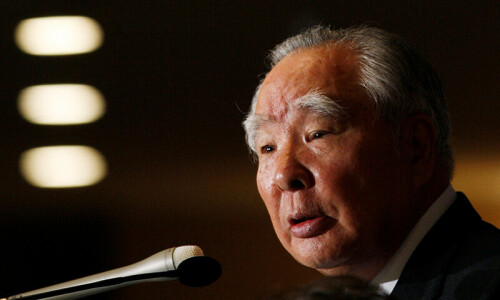WASHINGTON: The peculiar wobble of a subatomic particle called a muon in a US laboratory experiment is making scientists increasingly suspect they are missing something in their understanding of physics — perhaps some unknown particle or force.
Researchers on Thursday announced new findings about the muon (pronounced MEW-on), a magnetic and negatively charged particle similar to its cousin the electron but 200 times more massive, in their experiment at the US Energy Department’s Fermi National Accelerator Laboratory in Batavia, Illinois.
The experiment studied the wobble of muons as they travelled through a magnetic field. The muon, like the electron, has a tiny internal magnet that causes it to wobble — or, technically speaking, “precess” — like the axis of a spinning top while in a magnetic field.
But the wobble’s speed, as measured in the experiment, varied considerably from what was predicted based on the Standard Model of particle physics, the theory that explains how the basic building blocks of matter interact, governed by four fundamental forces in the universe.
The new findings, building on data released in 2021, continue to hint at some mysterious factor at play as the researchers try to sort out the discrepancy between the theoretical prediction and the actual experimental results.
“We are looking for an indication that the muon is interacting with something that we do not know about. It could be anything: new particles, new forces, new dimensions, new features of space-time, anything,” said Brendan Casey, a senior scientist at Fermilab and one of the authors of a research paper on the findings published in the journal Physical Review Letters.
“I like crazy so I would love this to be something like Lorentz violation or some other new property of space-time itself. That would be insane and revolutionary,” Casey added.
Casey was alluding to a principle called Lorentz invariance that holds that the laws of physics are the same everywhere.
“Yes, it is fair to say that it could be pointing to unknown particles or forces,” University College London physicist and study co-author Rebecca Chislett said.
“Currently due to new results in the theory community, it is difficult to say exactly what the discrepancy between the two (predicted muon behaviour and observed behaviour) is, but theorists are working hard to resolve this.”
The experiment was conducted at minus-450 degrees Fahrenheit (minus-268 degrees Celsius). The researchers shot beams of muons into a donut-shaped superconducting magnetic storage ring measuring 50 feet (15 metres) in diameter.
As the muons zipped around the ring travelling nearly the speed of light, they interacted with other subatomic particles that, like tiny dance partners, altered their wobble.
Published in Dawn, August 12th, 2023














































Dear visitor, the comments section is undergoing an overhaul and will return soon.